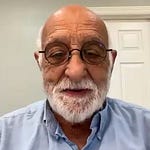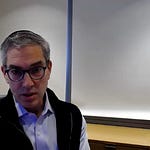Our Zoom call this week, for paid subscribers, will be at the usual time: Friday at Noon EST.
Our guest will be Mikhael Manekin. For me, some of the most unsettling scenes from Gaza have been the images of Jewish worship— a soldier using a knife as his yad (pointer) as he reads Torah, a soldier reciting the Shema from the balcony of a mosque, soldiers singing to welcome Shabbat at the Islamic University of Gaza. It’s not the liturgy itself that unnerves me. It’s the images of religious conquest, which make me fear this war’s consequences not just for Palestinians and Israelis, but for Judaism. Mikhael is the perfect person to ask about this. He’s one of the leaders of Faithful Left, a new movement of religious Israelis fighting Occupation and ethnic superiority. He’s a former director of Breaking the Silence, the organization of former Israeli soldiers that works to expose the reality of Israel’s occupation of the West Bank and Gaza Strip. And he’s the author of a new book about violence, morality and Judaism entitled, End of Days: Ethics, Tradition and Power in Israel.
Paid subscribers will get the link this Wednesday and the video the following week. They’ll also gain access to our library of past Zoom interviews with guests like Thomas Friedman, Ilhan Omar, Omar Barghouti, Benny Morris, Noam Chomsky, and Bret Stephens.
Sources Cited in this Video
Benjamin Netanyahu demands that Palestinians in Gaza be “deradicalized.”
The UN estimates that 85 percent of people in Gaza have been displaced their homes.
The Director of the United Nations Relief and Works Agency in Gaza estimates that 40 percent of the Strip’s people risk starvation.
According to The Wall Street Journal, almost 70 percent of Gaza’s homes are destroyed or damaged.
Prof. Devi Sridhar, chair of global public health at the University of Edinburgh, warns that in the coming year, 500,000 Palestinians in Gaza could die of disease.
Mairav Zonszein on the absence of Palestinians in Israeli media.
In a December poll, 83 percent of Israeli Jews said they support encouraging “voluntary migration” from Gaza.
Nikki Haley says Palestinians in Gaza should leave.
Things to Read
(Maybe this should be obvious, but I link to articles and videos I find provocative and significant, not necessarily ones I entirely agree with.)
In Jewish Currents (subscribe!), I wrote about how Harvard’s new antisemitism task force is ignoring its own antisemitism scholars.
For Jewish Currents’ podcast, On the Nose, I interviewed Muhammad Shehada and Khalil Sayegh about growing up in Gaza under Hamas.
In The New York Times, I wrote about how Israel might have responded differently to October 7
Bernie Steinberg, former executive director of Harvard Hillel, condemns the “McCarthyist tactic of manufacturing an antisemitism scare, which, in effect, turns the very real issue of Jewish safety into a pawn in a cynical political game to cover for Israel’s deeply unpopular policies with regard to Palestine.”
Sara Roy on Israel’s long war on Gaza.
The New York Times on Hamas’ use of sexual violence on October 7.
Abdalhadi Alijla, Rajan Menon, and Daniel Byman on why Israel can’t destroy Hamas.
Mosab Abu Toha’s exit from Gaza.
I talked about Israel’s war in Gaza and the debate about it in the US on Democracy Now, the Majority Report with Sam Seder, Briahna Joy Gray’s Bad Faith podcast and with Aaron Miller on WBUR.
See you on Friday at Noon,
Peter
VIDEO TRANSCRIPT:
Hi. A few days ago, Benjamin Netanyahu published an op-ed in The Wall Street Journal, laying out Israel’s war aims in Gaza. And among them was that Gaza’s population would have to be ‘deradicalized.’ And what Netanyahu meant by that was that they could no longer support violence against Israeli civilians, essentially. It’s really important that Palestinians don’t support violence against Israeli civilians. I just happen to think that this is exactly the wrong way to go about it since the right way to convince Palestinians not to support violence against Israeli civilians is to show that ethical resistance actually works, not to hold Palestinians under permanent occupation and cause massive catastrophe in Gaza, as Israel has done.
But putting that aside, it made me start to think about this idea of radicalization. Because if we take Netanyahu’s definition, essentially, that radicalization means support of violence against civilians, then it seems to me that we should be reckoning with the radicalization of many Jews both in Israel, and the United States, and around the world—and indeed, the radicalization of many Americans. Just look, after all, at the scale of the violence against civilians that most Israeli Jews, and almost all establishment American Jewish organizations, support. The United Nations now estimates that 85% of Gaza’s people have been displaced from their homes. The UN estimates that 40% risk starvation, that 70% of the homes in Gaza have been damaged or totally destroyed. And I’m going to read a quote from Professor Devi Sridhar, who’s the chair of global public health at the University of Edinburgh, who wrote this in The Guardian a few days ago: ‘unless something changes, the world faces the prospect of almost a quarter of Gaza’s 2 million population—close to half-a million human beings—dying within a year. These would be largely deaths from preventable health causes and the collapse of the medical system.’
So, this is the scale of the violence against civilians that has pretty significant Jewish support, both in Israel and around the world, and especially from the leading institutions of American Jewry. And not only from them, but from many American politicians—virtually the entire Republican Party. And it’s not only this massive destruction against civilians that enjoys widespread support, but indeed the ethnic cleansing of Palestinians in Gaza enjoys widespread support. There was a poll that recently showed that 83% of Israeli Jews would support what they call ‘voluntary migration’ from Gaza, which seems to me not very voluntary at all, given that you’ve created a massive humanitarian catastrophe from which people are trying to flee in order to save their lives. And Republican presidential candidate Nikki Haley endorsed ethnic cleansing of Gaza just a few days ago when she said that people in Gaza should go to ‘pro-Hamas countries.’
So, it seems to me that by Netanyahu’s own definition, we have a pretty serious problem of radicalization, in his words, in the American Jewish community and among American leaders. And people might say, no, no, no, it’s not the same because this Israeli violence against civilians is not purposeful. But I just don’t think after what we’ve seen over the past few months that’s sustainable at all. When you when you deny food and water and fuel to an entire population of 2 million, you can’t say it’s not purposeful when huge numbers of civilians die. Even Joe Biden, who has been a very stalwart supporter of Israel, has called Israel’s bombing in Gaza, ‘indiscriminate.’
So, the question it seems to me that we should be asking ourselves—those of us who are Jewish, and American, or both—is how did we get to this radicalization, this place where so many of us are willing to support this catastrophic destruction of human life in Gaza? And I don’t have a simple answer to that. I think this is something that I’m going to be thinking about and trying to write about for quite a long time to come. But I would just note this. Look at the publications that support this war: the publications in Israel, the publications in the United States. Look at the Jewish institutions that support this war. Look at the think tanks that support this war. And one of the things you will notice they have in common is they almost never platform Palestinians. If a publication does not publish Palestinians, you can be pretty certain it supports this war. Same with a television network. If a publication regularly publishes Palestinians, or a TV network regularly puts Palestinians on the air, or a think tank regularly hosts Palestinian speakers, or a Jewish institution regularly hosts Palestinian speakers, with almost exact certainty, you can be certain that they will not support this war. If people have exceptions, I’d be interested in hearing this, but I can’t off the top of my head think of a single exception. There is a very, very almost exact correlation between the willingness to listen to Palestinians and support for this war.
One of the things that I think Americans have not sufficiently appreciated about discourse in Israel, for instance, is the almost universal absence of Palestinian voices from Israeli mainstream media. This is a quote from Mairav Zonszein from the International Crisis Group’s representative in Israel. Mairav writes: ‘since this war began, there’s been almost no interviews in Israeli media with someone in Gaza or from Gaza. Even worse, I don’t think I’ve seen a single Palestinian politician, citizen, resident, anyone on any panel on Israeli TV since the war began.’ Where you have an absence of Palestinian voices, you have support for mass killing of Palestinians. You have radicalization. And I think that part of the reason for this, for this kind of close correlation between listening to Palestinians and not supporting this war, is simply that Palestinians will tell you—if you listen to them—that even putting morality aside, that this war is not going to work. I have literally not heard a single Palestinian commentator, journalist since October 7th—if there are examples, people are welcome to send them to me—tell me that they think that this war is going to be successful on its own terms, by which I mean making Israeli Jews more safe. Almost overwhelmingly, they’ve said they think it will make Israeli Jews less safe because it will create more Palestinian hatred and lead to more Palestinian desire for violence, perhaps even from groups that are more radical than Hamas.
So, partly I just think intellectually, if you listen to Palestinians, it’s likely to undermine the basic argument that people are making for this war. But I think at a more human level—maybe this is a really simplistic thing to say—I just think it’s very difficult to support massive violence against people that you can humanize, that you can see as fully human, that you listen to, and that you can identify with. And that’s why the almost total blackout on Palestinian voices in pro-war media is so important. And it’s why it’s such a moral disaster that for my entire adult lifetime there has been an almost total blackout on Palestinian voices in establishment American Jewish institutions, in schools, in camps, in synagogues, in Jewish community centers. It is that absence of voices that has created this radicalization, this profound dehumanization that allows people to look at these statistics about the number of Palestinians being killed, or perhaps just not even look at all because they’re not willing to take the time to do so, and basically be willing to support this. The radicalization is because of an unwillingness to see Palestinians as fully human. Now many people might not admit that they don’t see Palestinians as fully human, but my point is that their actions show that they don’t see Palestinians as fully human. Because when you see people as fully human, you give them the dignity of listening to them. And that is still not, still not the norm in establishment American Jewish life, in American Jewish communal life, and it’s not the norm in large parts of American public discourse, let alone Israeli public discourse. And that, it seems to me, is why we are where we are in this moment of utter human catastrophe, man-made human catastrophe in Gaza.








